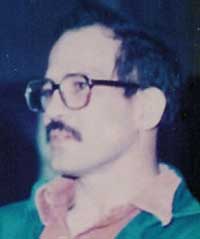The success and growth of gay wrestling today is the legacy of the hard work of heroes from the past.
Don Jung brought credibility to Gay Games wrestling, leveraging his mainstream reputation and skills as a competitor and coach to found Golden Gate Wrestling within the constructs of the Bay Area
 Don Jung formed Golden Gate Wrestling Club in 1981 at the request of Gay Games founder Dr. Tom Waddell. After coaching the team through the first two Gay Games and medalling in both, complications with AIDS drove him to suicide before Gay Games II ended. Don Jung formed Golden Gate Wrestling Club in 1981 at the request of Gay Games founder Dr. Tom Waddell. After coaching the team through the first two Gay Games and medalling in both, complications with AIDS drove him to suicide before Gay Games II ended.
|
Wrestling Association and California-USA Wrestling. Jung brought on board many other very influential people who signed on to our credibility as early as 1982. One of them was Alan Abraham San Francisco State; another was Steve Swanson.
Swanson was an Archbishop Riordan High School wrestling coach and teacher in the late 1970s and early 1980s. After his death, the high school honored him by naming its wrestling facility after him.
Pete Runyon's financial management of the first gay club in the late '70s, Southern California Wrestling Club (SCWC), was the prototype of economic resourcefulness. Their wrestlers carefully balanced the integrity of the sport with crowd appeal in order to have fun — and raise money.
Gary France's term as coach and president of GGWC (1988-1994) brought about the establishment of the GGWC CA-USAW charter and the institutionalized program within the San Francisco Parks & Recreation offerings. France's persistence with basketball's Tony Jasinski in finally earning the acceptance of gay sports at the Eureka Valley Rec Center in the Castro (now the Mark Bingham Gym), was a political milestone. That relationship survives today, and is the key to the success of SCWC, San Diego Bulldog Wrestling and GGWC.
Kathleen McAdams and Rochelle Robinson were both California women's freestyle wrestling champions who came out of the GGWC program to compete in Gay Games. The ultimate achievement was Rochelle's performance as an out lesbian at the USAW freestyle nationals in Orlando in 1998.
Only one competitor has wrestled in every Gay Games — Gene Dermody of Golden Gate.
The wrestling legacy continues to grow. Author Jim Provenzano's experience wrestling in the 1998 Gay Games inspired him to write the first coming-of-age wrestling novel, "PINS," adapted into a play and featured during the 2006 Gay Games.
 Don Jung formed Golden Gate Wrestling Club in 1981 at the request of Gay Games founder Dr. Tom Waddell. After coaching the team through the first two Gay Games and medalling in both, complications with AIDS drove him to suicide before Gay Games II ended.
Don Jung formed Golden Gate Wrestling Club in 1981 at the request of Gay Games founder Dr. Tom Waddell. After coaching the team through the first two Gay Games and medalling in both, complications with AIDS drove him to suicide before Gay Games II ended.